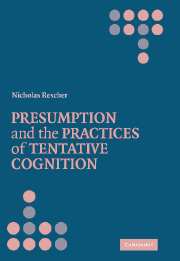Book contents
- Frontmatter
- Contents
- Preface
- Presumption and the Practices of Tentative Cognition
- 1 The Legal Roots Of Presumption
- 2 Presumption and Burden of Proof
- 3 Cognitive Presumption and Truth
- 4 Validating Cognitive Presumptions
- 5 Presumption and Inquiry
- 6 Default Reasoning
- 7 Presumption and Trust
- 8 Presumption and Communication
- 9 Presumption in Science and Beyond
- 10 Specificity Prioritization and the Primacy of the Particular
- 11 Dismissing Extremely Remote Possibilities
- Conclusion
- Bibliography
- Index of Names
1 - The Legal Roots Of Presumption
Published online by Cambridge University Press: 24 July 2009
- Frontmatter
- Contents
- Preface
- Presumption and the Practices of Tentative Cognition
- 1 The Legal Roots Of Presumption
- 2 Presumption and Burden of Proof
- 3 Cognitive Presumption and Truth
- 4 Validating Cognitive Presumptions
- 5 Presumption and Inquiry
- 6 Default Reasoning
- 7 Presumption and Trust
- 8 Presumption and Communication
- 9 Presumption in Science and Beyond
- 10 Specificity Prioritization and the Primacy of the Particular
- 11 Dismissing Extremely Remote Possibilities
- Conclusion
- Bibliography
- Index of Names
Summary
What Presumption Is All About
To presume in the presently relevant sense of the term is to accept something in the absence of the further relevant information that would ordinarily be deemed necessary to establish it. The term derives from the Latin praesumere: to take before or to take for granted.Presumption has figured in legal reasoning since classical antiquity. There is nothing modern or cutting-edge about it: it is one of the oldest tricks in the book.
Presumption found its first and still most prominent role in the context of the law, where a presumption mandates a trier to accept a certain fact once some other correlative fact has been established. The French Code civil defines “presumptions” as “Consequences drawn by the law or the magistrate from a known to an unknown fact.”Legal presumptions provide a way of filling in – at least pro tem – the gaps that obtain in conditions of incomplete information. (The “presumption of innocence” provides a paradigm example here.)
Such a legal presumption (praesumptio juris) is an inference from a fact that, by legal prescription, stands until refuted. Presumption of this sort is a gap-filling resource: it comes into operation only in the absence of relevant information or evidence, and it leaves the scene once suitably strong evidential indications come to view. One authority has elucidated the conception of presumption in the following terms:
A presumption in the ordinary sense is an inference. … The subject of presumptions, so far as they are mere inferences or arguments, belongs, not to the law of evidence, or to law at all, but to rules of reasoning.[…]
- Type
- Chapter
- Information
- Presumption and the Practices of Tentative Cognition , pp. 1 - 12Publisher: Cambridge University PressPrint publication year: 2006
- 1
- Cited by



